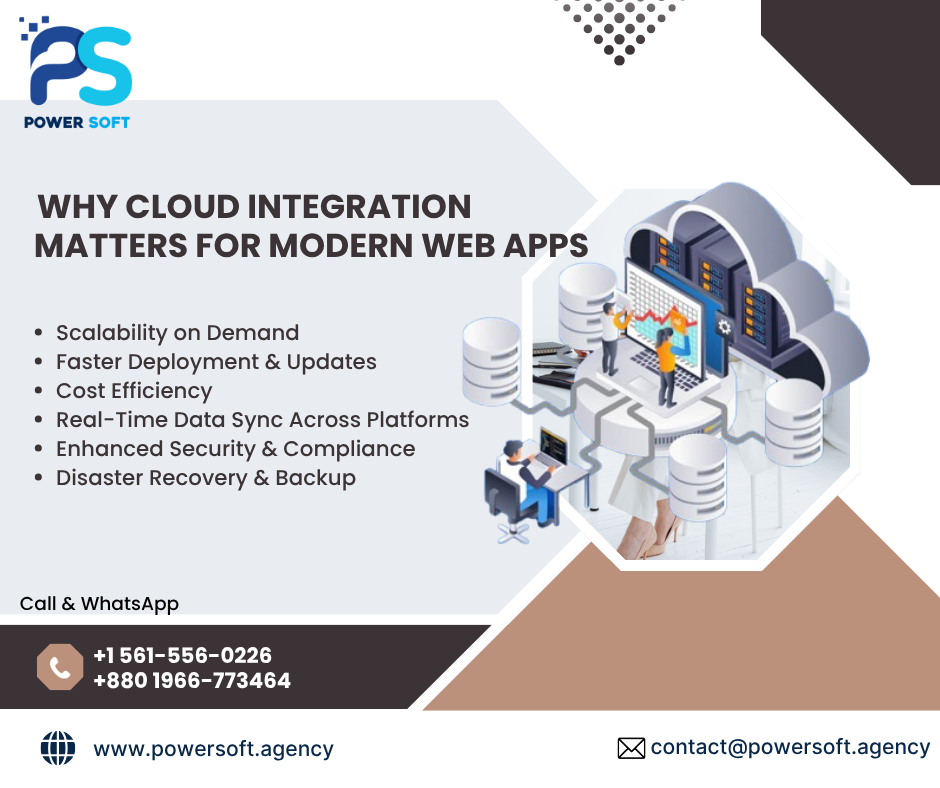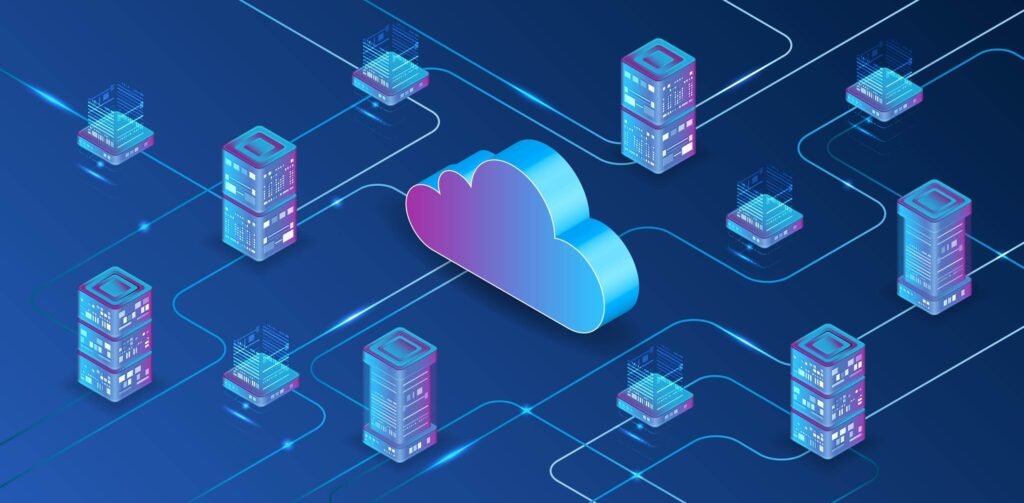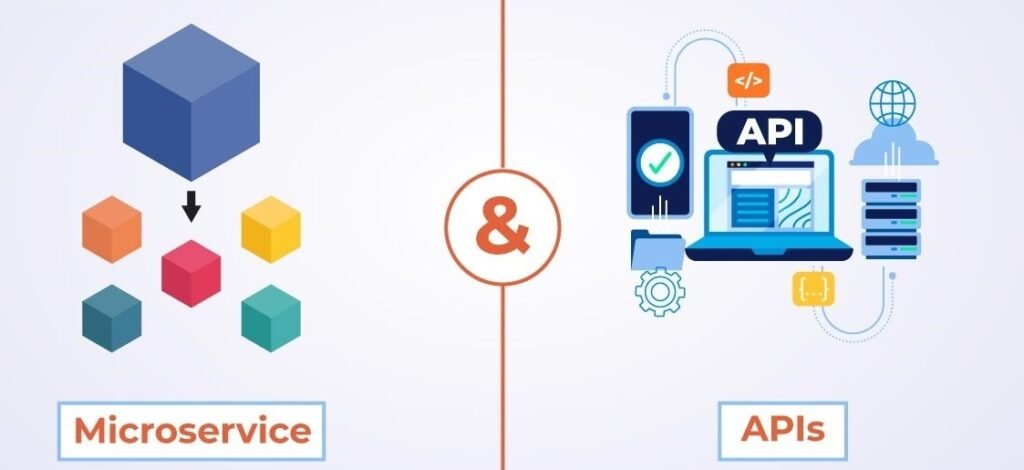
Cloud integration powers modern web apps with scalability, security, and agility. Power Soft delivers future-ready solutions for today’s digital demands.
In this blog, we’ll explore the top 10 reasons why cloud integration is crucial for modern web applications and how Power Soft’s expertise can help your business thrive.
1.Cloud Integration Enables Scalability on Demand

Modern web applications must handle fluctuating user loads without performance degradation. Cloud platforms like Azure and AWS enable automatic scaling based on real-time demand, ensuring your app remains fast and reliable at all times.
Why Scalability Matters:
Traditional on-premise infrastructure requires manual intervention or overprovisioning to manage variable traffic, which is both time-consuming and costly. In contrast, cloud platforms like Amazon Web Services (AWS), Microsoft Azure, and Google Cloud Platform offer auto-scaling capabilities that dynamically allocate resources based on real-time usage.
Benefits of Cloud Integration for Scalability:
- Elastic Resource Management: Automatically scale up during high traffic and scale down during low usage to optimize cost and performance.
- Consistent User Experience: Ensure fast load times and seamless performance regardless of how many users access your application simultaneously.
- No Downtime Deployment: Scale infrastructure without service interruptions, making your web app more reliable and responsive.
- Global Availability: Deploy across multiple regions to support global users with reduced latency.
Example Use Case:
E-commerce websites during Black Friday or mobile apps during product launches benefit immensely from cloud integration by maintaining consistent performance without requiring a complete overhaul of their backend infrastructure.
👉 Pro Tip:
Use auto-scaling groups and load balancers in your cloud environment to handle varying loads efficiently. Combine this with monitoring tools (like CloudWatch or Azure Monitor) for proactive performance management.
At Power Soft, we implement scalable cloud architectures tailored to your unique business needs, so you never worry about downtime or capacity constraints.
2. Cost Efficiency

Cloud integration reduces the need for expensive on-premises hardware and infrastructure maintenance. Pay-as-you-go models allow businesses to optimize operational costs by only paying for resources they use.
How Cloud Integration Reduces Costs:
- Eliminates Expensive Hardware:
No need to purchase or maintain physical servers. Cloud providers manage all infrastructure, saving you the cost of hardware, space, and energy. - Pay-as-You-Go Pricing:
Only pay for the compute, storage, and bandwidth your application actually uses. This model is especially cost-effective for startups and growing businesses that experience changing demand. - Lower Maintenance Overhead:
Cloud services automatically handle updates, patches, and maintenance — reducing the need for in-house IT resources. - Scalability Without Wastage:
Unlike traditional infrastructure, you don’t have to over-provision to handle peak loads. Cloud integration allows dynamic scaling, which means you’re not paying for unused capacity. - Improved Budget Predictability:
With clear usage metrics and billing, businesses can better forecast and manage their IT budgets.
Real-World Example:
A SaaS company can launch its application using cloud platforms like AWS, Azure, or Google Cloud and scale as needed. Rather than investing thousands in hardware, they start small and grow efficiently — making cloud integration a strategic advantage.
Our team helps you migrate your web apps to the cloud cost-effectively, maximizing ROI while minimizing upfront expenses.
3. Improved Security and Compliance

Cloud providers invest heavily in security measures, offering features like data encryption, identity management, and continuous monitoring. Integrating your web app with these platforms enhances your security posture and simplifies compliance with regulations.
Key security benefits include:
- Data encryption at rest and in transit
- Role-based access controls
- Automated security patching
- Regulatory compliance support (GDPR, HIPAA, etc.)
Power Soft ensures your cloud integration includes best-in-class security protocols, protecting sensitive data across your applications.
4. Faster Time to Market

Cloud integration accelerates development cycles by providing ready-to-use infrastructure, APIs, and services. This enables rapid deployment and continuous delivery of updates and new features.
Benefits for your business:
- Agile development pipelines
- Faster prototyping and testing
- Continuous integration and continuous delivery (CI/CD) support
Our agile development approach leverages cloud services to help you launch and iterate faster, keeping you ahead in competitive markets.
5. Cloud Integration Enables Seamless Multi-Platform Access

In today’s always-connected world, users expect to access web applications from anywhere, at any time, and on any device. Whether it’s a smartphone, tablet, laptop, or desktop, consistent functionality and real-time synchronization are no longer optional — they’re expected.
This is where cloud integration plays a pivotal role in delivering a truly seamless multi-platform experience.
Why Multi-Platform Access Matters:
Modern users move between devices throughout the day. A customer might start a transaction on a mobile app, continue on a laptop, and finalize it on a tablet. Without seamless cloud-based syncing and accessibility, this kind of experience breaks down.
How Cloud Integration Supports Multi-Device Accessibility:
- Real-Time Data Synchronization:
Cloud integration ensures that user data is always up-to-date across all platforms, providing a consistent experience without delays or conflicts. - Cross-Device Compatibility:
Cloud infrastructure supports responsive design, API access, and centralized backends — making it easier to deliver functionality across different device types and operating systems. - Global Availability:
Through Content Delivery Networks (CDNs) and distributed cloud servers, your application remains accessible with low latency, regardless of the user’s location. - Centralized Authentication & Access Control:
Secure login systems (like OAuth, SSO) powered by the cloud ensure users can log in from any device with consistent security and user permissions. - Offline Capabilities with Sync on Reconnect:
Some cloud services allow local data caching with background syncing once the device reconnects — enhancing user experience even in areas with poor internet.
Real-World Example:
A productivity app like Google Docs or Trello offers seamless access across devices, allowing users to switch from mobile to desktop without missing a beat. This is possible through intelligent cloud integration that handles data consistency and real-time collaboration.
With Power Soft, your applications deliver consistent user experiences across platforms, powered by cloud connectivity.
6. Robust Disaster Recovery

Cloud services include built-in backup and disaster recovery solutions that protect your web applications from data loss and downtime caused by unexpected failures.
Disaster recovery features include:
- Automated backups
- Geographic data redundancy
- Rapid failover and recovery options
We design resilient cloud-integrated systems to ensure business continuity even during emergencies.
7. Cloud Integration Powers Advanced Analytics Capabilities

Cloud platforms support integration with powerful analytics tools like Power BI and Tableau, providing actionable insights that drive smarter business decisions.
How Cloud Integration Enhances Data Analytics:
- Seamless Integration with BI Tools:
Cloud platforms like Azure, AWS, and Google Cloud offer native integrations with industry-leading tools such as Power BI, Tableau, Looker, and Google Data Studio. These tools help transform raw data into interactive dashboards and visual reports. - Real-Time Data Processing:
With cloud-enabled pipelines, businesses can process large volumes of data instantly and make decisions in real time. This is crucial for apps that rely on live user feedback, financial transactions, or sensor data. - Centralized Data Storage:
Cloud integration consolidates data from various sources into a single location (like data lakes or warehouses), making it easier to manage, analyze, and secure information. - Predictive & Prescriptive Analytics:
Advanced cloud services support machine learning and AI-based models that not only analyze historical data but also predict future trends and suggest optimal actions. - Scalable Analytics Infrastructure:
Cloud solutions scale effortlessly with data volume. Whether you’re analyzing data for 100 users or 1 million, cloud platforms can adjust resources on the fly.
Real-World Example:
An e-commerce business can integrate their web application with Power BI via cloud services, pulling real-time sales, traffic, and conversion data to identify high-performing products, seasonal trends, and customer behavior patterns — all powered by cloud integration.
Our cloud integration services incorporate data analytics capabilities, helping you unlock the true value of your application data.
8. Flexibility with Hybrid Architectures

Many businesses operate in hybrid environments combining on-premises and cloud resources. Cloud integration supports this flexibility, enabling smooth data and process flows across systems.
What Is a Hybrid Architecture?
A hybrid architecture combines private (on-premises) systems with public cloud platforms like AWS, Azure, or Google Cloud. It allows businesses to take advantage of cloud scalability while maintaining critical systems locally for security, compliance, or performance reasons.
🔑 How Cloud Integration Supports Hybrid Environments:
- Seamless Data Flow:
Enables secure and automated data exchange between on-prem and cloud systems without manual syncing. - Process Orchestration Across Platforms:
Cloud integration tools like Azure Logic Apps, AWS Step Functions, and MuleSoft allow workflows to run across mixed environments effortlessly. - Improved Business Continuity:
Businesses can distribute workloads between environments for redundancy, performance optimization, and failover support. - Flexibility for Legacy Systems:
Maintain legacy databases or applications on-prem while building modern features in the cloud — all connected through cloud integration layers. - Security & Compliance Balance:
Keep sensitive data on-premise to meet compliance requirements, while leveraging cloud resources for analytics, scalability, or user-facing features.
Real-World Example:
A healthcare company may store sensitive patient records on local servers to comply with data protection laws, but still use cloud services for analytics and appointment scheduling. This is possible only through effective cloud integration in a hybrid setup.
Power Soft’s experts build hybrid cloud architectures that fit your existing infrastructure while leveraging cloud benefits.
9. Support for Microservices & APIs

Modern web applications are increasingly built using microservices and API-first architectures to improve agility, modularity, and scalability. Instead of one large monolithic codebase, applications are broken down into smaller, independent services — each responsible for a specific function.
Cloud integration is essential for managing, deploying, and scaling these microservices efficiently in today’s dynamic development landscape.
What Are Microservices and Why Do They Matter?
Microservices allow developers to build and deploy application features independently. Each service can be written in different languages, maintained by separate teams, and updated without affecting the whole system — making it ideal for continuous delivery and fast-paced development.
APIs (Application Programming Interfaces) are the glue that connects these services and enables communication between internal components, third-party services, and front-end interfaces.
How Cloud Integration Enhances Microservices and APIs:
- Containerization & Orchestration Support:
Cloud platforms like AWS (with ECS/EKS), Azure Kubernetes Service (AKS), and Google Kubernetes Engine (GKE) offer robust support for running containerized microservices using tools like Docker and Kubernetes. - API Gateways & Management:
Cloud integration enables secure, scalable management of APIs using services like AWS API Gateway, Azure API Management, or Apigee. - Service Discovery & Load Balancing:
Automatically route requests to the correct microservices with built-in load balancers and service discovery mechanisms provided by cloud platforms. - Independent Scaling:
Scale individual microservices based on specific usage metrics, rather than scaling the entire application — improving resource efficiency. - Faster Development and Deployment:
Microservices can be built and deployed independently through cloud-native CI/CD pipelines, speeding up time-to-market and enabling quick updates.
We specialize in API-first development and microservices-based solutions, ensuring your cloud-integrated apps remain agile and maintainable.
10. Future-Proofing Your Business

With the rapid pace of technological innovation, cloud integration ensures your web applications stay compatible with emerging tools and frameworks, protecting your investment for the long term.
Why Future-Proofing Matters:
Web applications built on rigid, outdated systems quickly become obsolete. As new frameworks, APIs, and tools emerge, adapting legacy systems becomes expensive and time-consuming — if not impossible.
Cloud integration allows your applications to remain agile, compatible, and ready for continuous innovation.
How Cloud Integration Supports Future Readiness:
- Easy Integration with Emerging Technologies:
Quickly adopt and integrate new tools like AI/ML services, IoT platforms, and edge computing without massive architectural changes. - Platform and Language Agnostic:
Cloud platforms support a wide range of programming languages, runtimes, and deployment models, ensuring your app evolves with the industry. - Continuous Updates & Feature Releases:
Cloud providers frequently update services with new features and security patches, ensuring your applications are always up to date without manual intervention. - Vendor Flexibility & Interoperability:
Easily switch or combine cloud vendors based on performance, pricing, or compliance needs without locking your business into a single ecosystem. - Future-Proof DevOps & CI/CD Pipelines:
Automate deployment, testing, and monitoring processes using cutting-edge DevOps tools that integrate seamlessly with your cloud environment.
Real-World Example:
A fintech startup using cloud integration can quickly adopt AI fraud detection APIs, modern payment gateways, or even blockchain integrations as the industry evolves — without rebuilding their core platform.
Power Soft helps you adopt future-ready cloud technologies like serverless computing and AI integrations to keep your applications cutting-edge.
How Power Soft Can Help with Your Cloud Integration Needs
At Power Soft, we understand the critical role cloud integration plays in modern web applications. Our core services include:
- Custom Web Application Development: Leveraging ASP.NET Core, Angular, React, and NodeJS to build scalable, cloud-ready apps.
- Cloud Integration & Migration: Seamlessly connecting your existing systems with Azure, AWS, or hybrid cloud platforms.
- Data Analytics & Reporting: Integrating Power BI, Tableau, and Python analytics tools to provide real-time insights.
- Business Process Automation & ERP Solutions: Automating workflows and ERP systems in the cloud for improved efficiency.
Why Choose Power Soft?
- 15+ Years of Proven Expertise
- Secure & Scalable Solutions
- Deep Cloud Platform Knowledge
- Client-Centric, Results-Driven Approach
Let’s Future-Proof Your Business
We help you embrace the cloud with confidence. Whether you’re migrating existing systems or building from scratch, Power Soft is your trusted cloud integration partner.
📧 Email: contact@powersoft.agency
🌐 Website: https://www.powersoft.agency/blog
📞 Call & WhatsApp 1: +1 561-556-0226
📞 Call & WhatsApp 2: +88 01966 773464